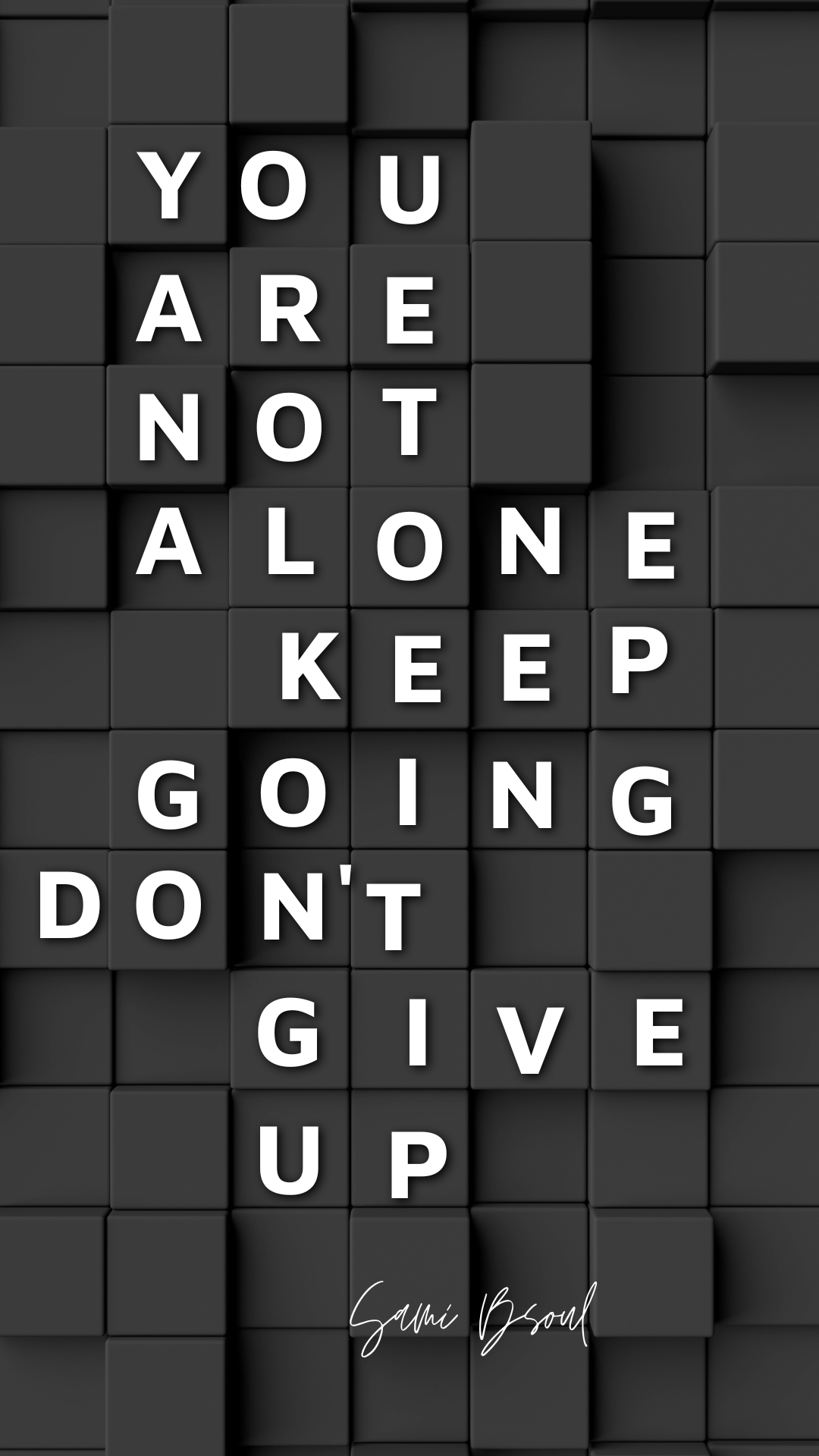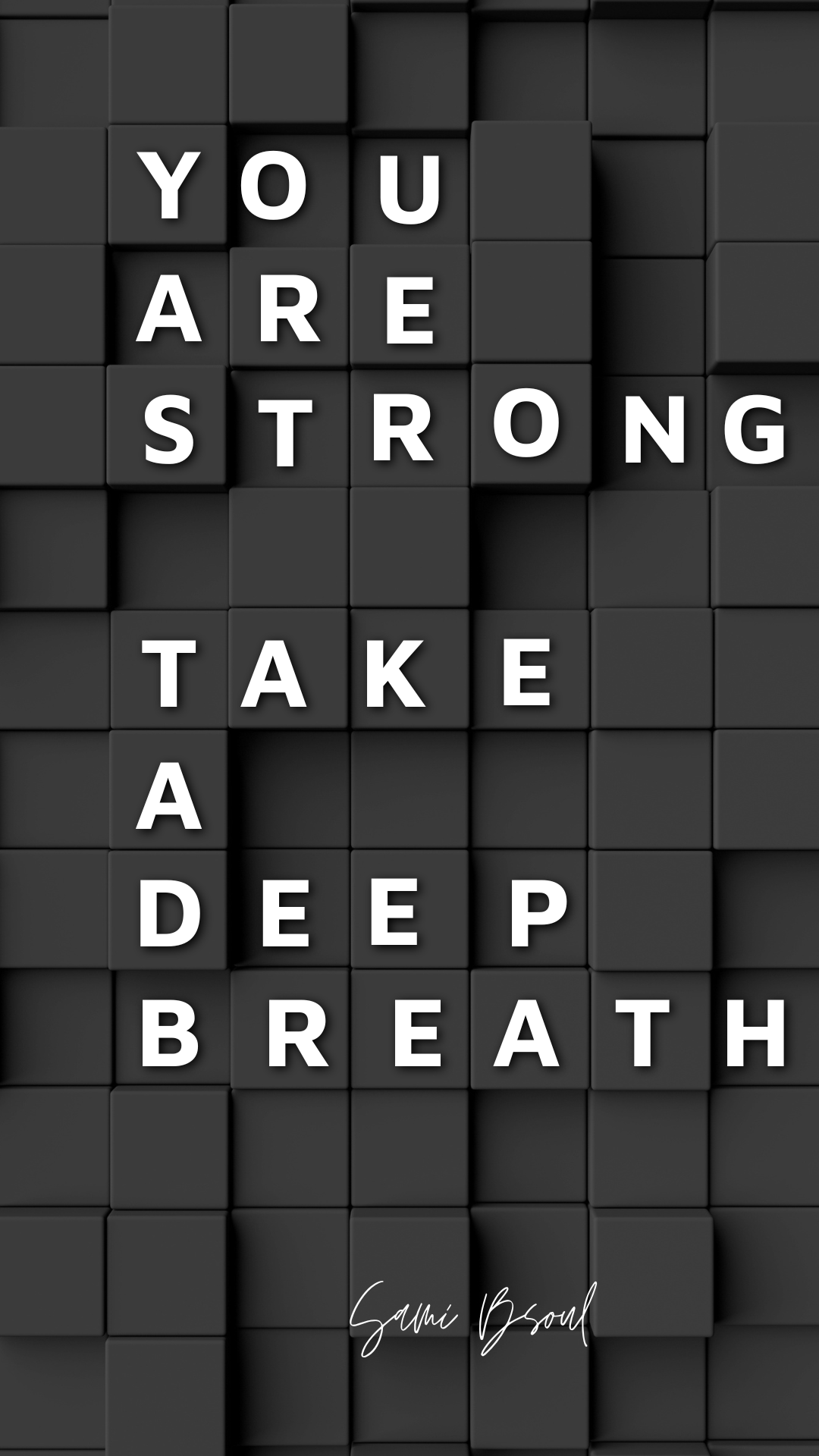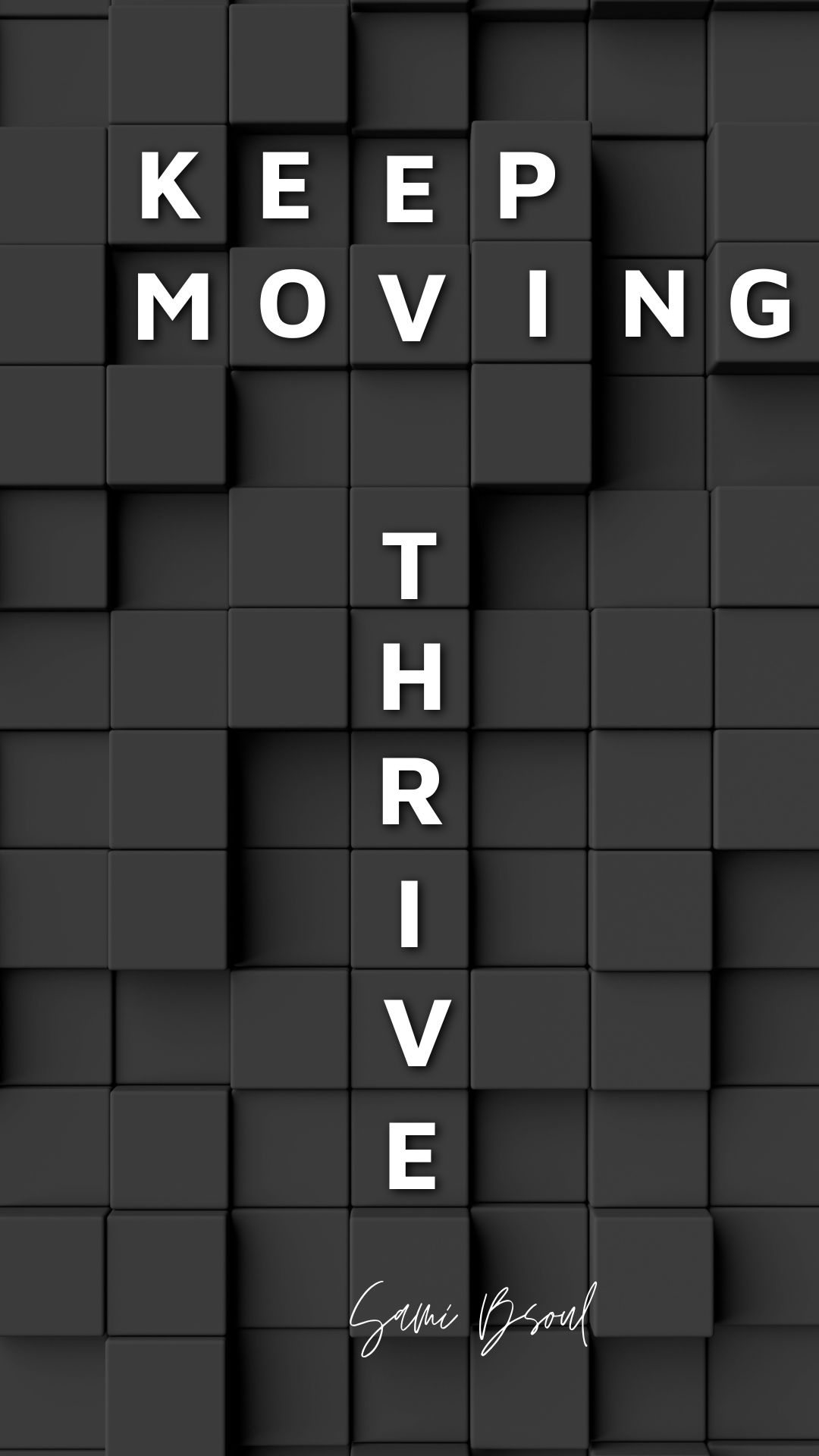Take Care, Stress Less
Take Care, Stress Less: A Guide to Self-Care and Stress Management for Your Mind, Body, and Spirit
By Sami Bsoul
Stress is like weather, it can bring both positive and negative outcomes to our lives. Just like a beautiful sunny day can fill us with joy and positivity, some level of stress can motivate us and drive us to achieve our goals. When stress becomes excessive and

prolonged, it can be detrimental to our physical and mental health.
Stress is an inevitable part of life. It can come from various sources, such as work, relationships, financial pressures, and health issues. While some level of stress can be motivating and beneficial, prolonged and intense stress can take a toll on our mental and physical health. Therefore, it is crucial to learn how to manage stress effectively.

Stress is akin to an unanticipated tempest that can catch us off guard. Just as a storm brings strong winds, heavy rains, and thunder, stress can bring a surge of intense emotions, physical tension, and mental strain. Just like a storm can disrupt our plans, stress can disrupt our daily routines and our ability to function effectively. However, just as we can prepare for a storm by taking shelter and securing our belongings, we can also prepare for stress by engaging in self-care practices. By building a strong foundation of self-care, we can weather the storms of stress and emerge stronger and more resilient on the other side.

A. Definition of stress
Stress is a physiological and psychological response to an internal or external stimulus that disrupts the body's balance or homeostasis. It can trigger the body's stress response system, which prepares us to react to perceived threats or challenges. In some cases, stress can help us perform better under pressure, stay focused and alert, and adapt to new situations. However, chronic stress can lead to a range of health problems, including anxiety, depression, insomnia, digestive issues, and heart disease.
It is crucial to learn how to manage stress effectively through self-care practices. Self-care refers to any deliberate and proactive activity that supports our physical, mental, and emotional well-being. By engaging in self-care, we can boost our resilience and coping mechanisms, reduce the negative impact of stress, and prevent burnout.

B. Importance of self-care in stress management
Self-care plays a crucial role in managing stress. It refers to any deliberate and proactive activity that supports our physical, mental, and emotional well-being. By engaging in self-care practices, we can boost our resilience and coping mechanisms, reduce the negative impact of stress, and prevent burnout.
Self-care is like a life raft that can help us navigate the turbulent waters of stress. Just as a life raft can keep us afloat and prevent us from drowning in the midst of a stormy sea, self-care practices can help us stay resilient and maintain our physical and mental well-being in the face of stress.
When we neglect self-care, we risk becoming like a tree in a drought. Just as a tree needs water, nutrients, and sunlight to grow and thrive, we need self-care practices to nourish our bodies and minds. Without adequate self-care, we become vulnerable to the effects of stress, and our health and well-being suffer.
Therefore, practicing self-care is like being a gardener who tends to a garden. Just as a gardener nurtures the soil, plants, and flowers to create a beautiful and healthy garden, we need to nurture ourselves through self-care practices to create a healthy and thriving life. By engaging in self-care, we can cultivate a sense of balance, harmony, and well-being that can help us navigate the ups and downs of life with grace and resilience.

C. My statement
In this article, I will explore the different aspects of self-care and stress management. I will discuss the importance of understanding stress, the strategies for self-care, and the ways to manage stress effectively. By the end of this article, you will have a comprehensive understanding of how self-care can help you manage stress, including the positive aspects of stress, and improve your overall health and well-being.

II. Understanding Stress
Stress is a normal part of life and can be defined as the body's response to any demand or challenge. It is the feeling of being overwhelmed, frustrated, or anxious when we face a situation that we perceive as a threat or challenge.
Stress can be triggered by both positive and negative events, such as starting a new job, getting married, or experiencing a loss or trauma. It is a natural response that helps us adapt to change and protect ourselves from harm.
When we experience stress, our body releases hormones, such as adrenaline and cortisol, which activate the "fight or flight" response. This response is designed to help us respond quickly to a perceived threat by increasing our heart rate, blood pressure, and respiration. It also triggers the release of glucose into the bloodstream to provide energy to the muscles.
When stress becomes chronic or excessive, it can lead to negative physical and mental health outcomes. Chronic stress can lead to the depletion of energy resources, exhaustion, and burnout. It can also weaken the immune system and increase the risk of developing chronic diseases, such as heart disease, diabetes, and depression.

Therefore, it is important to understand how stress affects our body and mind and to learn how to manage it effectively through self-care practices. By understanding stress and its impact on our health, we can take proactive steps to prevent and manage it, and cultivate a sense of balance and well-being in our lives.
Stress is like a wave in the ocean that can either propel us forward or pull us under. Just as a wave can give us a thrilling ride or overwhelm us with its force, stress can motivate us to achieve our goals or leave us feeling exhausted and overwhelmed.
Stress is a natural response to any demand or challenge, and it can be triggered by both positive and negative events. It is the body's way of preparing us to respond to a perceived threat or challenge by releasing hormones that activate the "fight or flight" response.
Just like a river that overflows its banks and causes damage, chronic stress can lead to negative physical and mental health outcomes. It can deplete our energy resources, affect our mood and cognitive abilities, and increase the risk of developing chronic diseases.

Therefore, managing stress is like being a skilled surfer who rides the waves with grace and ease. Just as a surfer learns how to navigate the waves by staying balanced, focused, and resilient, we can learn how to manage stress by cultivating self-care practices that support our physical, mental, and emotional well-being.
By understanding stress and its impact on our health, we can learn to ride the waves of stress with skill and grace, rather than being pulled under by its force. We can cultivate a sense of balance, resilience, and well-being that allows us to face life's challenges with confidence and ease.
A. Types of stress
There are three main types of stress: acute stress, episodic acute stress, and chronic stress.
It is important to recognize the different types of stress and their effects on our health, so we can take proactive steps to manage them. By practicing self-care and stress management techniques, we can reduce the negative impact of stress on our physical and mental well-being, and improve our overall quality of life.
Acute Stress
Acute stress is like a sudden gust of wind that catches us off guard. It can happen in an instant, triggered by a perceived threat or challenge, like a near miss in traffic or a surprise presentation at work. Just as a gust of wind can make us feel disoriented and unsteady, acute stress can cause feelings of anxiety, irritability, and physical symptoms like headaches and stomach upset.
However, like a skilled sailor who adjusts the sails to navigate the winds, we can learn to manage acute stress by practicing self-care and stress management techniques. By staying present in the moment, focusing on our breathing, and practicing mindfulness, we can reduce the impact of acute stress on our physical and mental well-being, and navigate through it with grace and ease.
Acute stress is the most common type of stress and is usually caused by a single event or situation. It is a short-term stress response that is triggered by a perceived threat or challenge, such as a near miss in traffic, an argument with a loved one, or a deadline at work. Acute stress can be a positive force that helps us stay alert and focused in the moment, but it can also be overwhelming and cause anxiety, irritability, and physical symptoms like headaches and stomach upset.

Episodic Acute Stress
Episodic acute stress is like a series of small fires that keep breaking out in our lives. It can be caused by a pattern of frequent, acute stressors, like a high-pressure job, a chaotic home life, or a constant sense of urgency. Just as small fires can quickly become out of control, episodic acute stress can lead to physical and mental exhaustion, anxiety, and irritability.
However, like a skilled firefighter who is prepared with a plan and the right tools, we can learn to manage episodic acute stress by practicing self-care and stress management techniques. By identifying the underlying causes of stress, setting boundaries, and adopting healthy coping strategies, we can extinguish the fires of episodic acute stress and prevent them from spreading. With practice and perseverance, we can develop the skills to manage stress and enjoy a more peaceful and fulfilling life.
Episodic acute stress is a pattern of stress that occurs when a person experiences acute stress on a regular basis. It is often characterized by a tendency to worry excessively, being constantly in a rush, and feeling like things are always going wrong. People who experience episodic acute stress often have a negative outlook on life and may struggle to manage their emotions and relationships.

Chronic Stress
Chronic stress is like a heavy weight that we carry on our shoulders every day. It can be caused by ongoing challenges or stressors, like a demanding job, financial problems, or a chronic health condition. Just as a heavy weight can make us feel tired and strained, chronic stress can cause physical and mental exhaustion, leading to health problems like heart disease, diabetes, and depression.
However, like a weightlifter who gradually builds strength and endurance to lift heavier weights, we can learn to manage chronic stress by practicing self-care and stress management techniques. By setting boundaries, prioritizing self-care activities, and seeking support from friends and professionals, we can gradually reduce the weight of chronic stress and build resilience to face future challenges.
Chronic stress is a long-term stress response that is caused by ongoing challenges or stressors, such as financial problems, a demanding job, or a chronic health condition. It is the most harmful type of stress and can lead to physical and mental health problems like heart disease, diabetes, anxiety, and depression. Chronic stress can also lead to burnout, which is a state of physical, emotional, and mental exhaustion that results from prolonged exposure to stress.

B. Causes of stress
Stress can be caused by a wide range of internal and external factors. Internal factors include our thoughts, beliefs, and emotions, while external factors include environmental, social, and economic factors. Here are some common causes of stress:
Work-related stress: Pressure to meet deadlines, job insecurity, long working hours, and conflicts with colleagues or supervisors can all contribute to work-related stress.
Financial stress: Money problems, debt, and financial uncertainty can cause significant stress, leading to physical and mental health problems.
Relationship stress: Problems in intimate relationships, family conflicts, and social isolation can all contribute to relationship stress.
Health-related stress: Chronic illness, injury, pain, and disability can cause significant stress and impact our quality of life.
Trauma and loss: Traumatic events like natural disasters, accidents, and violence, as well as loss of a loved one, can lead to acute stress and post-traumatic stress disorder (PTSD).
Lifestyle factors: Unhealthy habits like poor diet, lack of exercise, smoking, and alcohol or drug use can all contribute to stress and negatively impact our physical and mental health.
By understanding the common causes of stress, we can take steps to mitigate their impact and reduce our overall stress levels. This may include adopting healthy lifestyle habits, seeking professional help, and practicing stress management techniques like mindfulness, meditation, and relaxation exercises.

C. Effects of Stress on Mental and Physical Health
Stress can have a significant impact on both our mental and physical health. Here are some common effects of stress:
Mental health: Chronic stress can lead to anxiety, depression, and other mental health disorders. Stress can also impair our ability to concentrate, make decisions, and remember information.
Cardiovascular health: Stress can raise blood pressure and increase the risk of heart disease, stroke, and other cardiovascular problems.
Immune system function: Chronic stress can weaken the immune system, making us more susceptible to infections and diseases.
Digestive health: Stress can cause digestive problems like irritable bowel syndrome (IBS), acid reflux, and ulcers.
Sleep disturbances: Stress can disrupt our sleep patterns, leading to insomnia, nightmares, and other sleep disorders.
Chronic pain: Stress can exacerbate chronic pain conditions like fibromyalgia, arthritis, and back pain.
It's important to recognize the physical and mental symptoms of stress and take steps to manage them. This may include seeking professional help, adopting healthy lifestyle habits, practicing relaxation techniques, and making changes to our environment or daily routines to reduce stress. By managing stress effectively, we can protect our mental and physical health and enjoy a better quality of life.

III. Self-Care Strategies
When it comes to managing stress, self-care is essential. By taking care of ourselves, we can reduce the negative impact of stress on our mental and physical health. In this section, I will explore some effective self-care strategies that can help us manage stress and improve our overall well-being.
A. Physical Self-Care
Exercise
Physical activity is an effective way to manage stress and maintain physical health. Exercise helps to release endorphins, which are natural mood-boosters. Regular exercise also helps to reduce muscle tension and improve sleep quality. Aim for at least 30 minutes of moderate exercise each day, such as brisk walking, jogging, cycling, or swimming.
Nutrition
What we eat can have a significant impact on our mental and physical well-being. A balanced and nutritious diet is essential for managing stress. Avoid processed foods, excess sugar, and caffeine, which can exacerbate stress. Instead, aim for a diet that is rich in fruits, vegetables, whole grains, lean protein, and healthy fats.
Sleep
Getting enough sleep is essential for our overall health and well-being. Lack of sleep can lead to increased stress, mood swings, and reduced cognitive function. Aim for 7-9 hours of sleep each night, and try to establish a regular sleep routine. This may include avoiding screens before bedtime, creating a relaxing sleep environment, and practicing relaxation techniques.
Hygiene
Maintaining good personal hygiene is essential for physical health and well-being. This includes washing hands regularly, brushing teeth twice a day, and showering or bathing daily. Good hygiene practices can also help to boost our self-esteem and improve our mental health.
B. Emotional Self-Care
Mindfulness
Mindfulness is a powerful tool for managing stress and promoting emotional well-being. It involves being present and fully engaged in the current moment, without judgment or distraction. Mindfulness practices may include meditation, deep breathing exercises, or yoga. These practices can help to reduce feelings of anxiety and improve overall mood.
Relaxation techniques
Relaxation techniques, such as progressive muscle relaxation or visualization, can help to reduce muscle tension and promote a sense of calm. These techniques involve focusing on specific muscles or mental images and consciously releasing tension. Regular practice of relaxation techniques can help to reduce stress and promote emotional well-being.
Journaling
Journaling is a great way to process emotions and reduce stress. By putting our thoughts and feelings on paper, we can gain a better understanding of our experiences and identify areas of concern. Journaling can also serve as a creative outlet and help us to express ourselves more effectively.
Social support
Maintaining strong social connections is essential for emotional well-being. Spending time with friends and loved ones can help to reduce stress and promote feelings of happiness and fulfillment. Seek out positive social interactions and make an effort to maintain relationships that are supportive and nurturing.

C. Mental Self-Care
Self-reflection
Self-reflection is a key aspect of mental self-care. It involves taking the time to look inward and examine our thoughts, emotions, and behaviours. Through self-reflection, we can gain a better understanding of ourselves and identify areas where we can make positive changes. This can include identifying negative thought patterns or self-limiting beliefs, and working to develop a more positive and growth-oriented mindset.
Hobbies and interests
Engaging in activities that we enjoy is an important aspect of mental self-care. Hobbies and interests can provide a sense of fulfillment and help us to recharge our batteries. Whether it's painting, gardening, or playing a musical instrument, find an activity that brings you joy and make time for it regularly.
Learning and growth
Engaging in learning and personal growth can help us to develop new skills, expand our knowledge, and foster a sense of purpose. This can include reading, taking courses or workshops, or pursuing a new hobby. By challenging ourselves to learn and grow, we can build our self-confidence and develop a more positive outlook on life.
D. Spiritual Self-Care
Meditation
Meditation is a practice that involves quieting the mind and focusing on the present moment. It can help to reduce stress and anxiety, promote relaxation, and improve overall well-being. Regular meditation can also help us to develop a greater sense of self-awareness and a deeper understanding of our thoughts and emotions.
Gratitude
Practicing gratitude involves focusing on the positive aspects of our lives and expressing appreciation for them. This can include keeping a gratitude journal, taking time to reflect on the things we are grateful for, or expressing gratitude to others. By cultivating a sense of gratitude, we can shift our focus away from negativity and develop a more positive and optimistic outlook on life.
Purpose and meaning
Engaging in activities that give our lives purpose and meaning is an important aspect of spiritual self-care. This can involve volunteering, pursuing a meaningful career, or participating in activities that align with our values and beliefs. By living a life that is aligned with our sense of purpose and meaning, we can experience greater fulfillment and a deeper sense of well-being.
IV. Implementing Self-Care Strategies
Implementing self-care strategies is essential for maintaining optimal physical, emotional, mental, and spiritual well-being. While self-care practices can vary from person to person, the benefits of engaging in these activities are universal. By taking care of ourselves, we are better equipped to handle the challenges and stresses of daily life. In this section, I will explore practical ways to implement self-care strategies into our daily routines, so that we can live more balanced, healthy, and fulfilling lives.
A. Setting priorities
Setting priorities is a crucial first step in implementing self-care strategies. It involves identifying the most important aspects of your life and focusing your time and energy on them. Prioritizing self-care may require making some difficult choices and saying no to activities or commitments that do not align with your values or goals. By setting priorities and making intentional choices, you can create space in your life for self-care practices that support your overall well-being.
B. Creating a self-care plan
Creating a self-care plan involves identifying the specific self-care practices that are most beneficial for you and developing a plan to incorporate them into your daily routine. This plan should be individualized and tailored to your unique needs and preferences. A self-care plan may include activities such as exercise, meditation, journaling, or spending time with loved ones. The plan should also include specific times and durations for each activity, as well as a way to track progress and make adjustments as needed.
C. Overcoming barriers to self-care
There may be obstacles that prevent you from engaging in self-care practices, such as a lack of time, resources, or support. It is important to identify these barriers and develop strategies to overcome them. This may involve delegating tasks, seeking out social support, or finding creative solutions to time constraints. Overcoming barriers to self-care requires a willingness to prioritize your own needs and find ways to make self-care a non-negotiable part of your routine.
Incorporating self-care into your daily routine is essential for making it a consistent and sustainable practice. This may involve carving out specific times in your day for self-care activities, such as waking up early to exercise or meditate, or taking a lunch break to go for a walk. It may also involve finding ways to incorporate self-care into other daily activities, such as practicing mindfulness while doing household chores. By making self-care a regular part of your routine, you can cultivate a sense of balance and well-being in your daily life.
V. Managing Stress
Stress is an inevitable part of life, but it's how we respond to it that can make all the difference. In order to live a healthy and fulfilling life, it's essential to develop effective strategies for managing stress. This requires a combination of self-awareness, resilience, and practical skills. In this section, I will explore a range of techniques for managing stress, from mindfulness and relaxation to problem-solving and time management. By learning how to manage stress effectively, you can build a more resilient and balanced life, and enjoy greater well-being and happiness.
A. Identifying stress triggers
Identifying stress triggers is a crucial first step in managing stress. Stress triggers are the specific events, situations, or people that cause you to feel stressed. These triggers can be anything from a work deadline, to a difficult conversation with a loved one, to simply being in a crowded or noisy environment. By identifying your personal stress triggers, you can start to understand the patterns and causes of your stress reactions.
One effective way to identify stress triggers is to keep a stress diary or journal. Whenever you feel stressed, take note of the time, place, and circumstances of the event. Write down your thoughts, feelings, and physical sensations, as well as any other relevant details. Over time, you will start to notice patterns and trends in your stress triggers.
Another way to identify stress triggers is to simply pay attention to your body and your emotions. Notice how your body responds to different situations and stimuli, and pay attention to any changes in your mood or energy levels. If you find that certain situations consistently lead to feelings of stress, these are likely to be your stress triggers.
Once you have identified your stress triggers, you can start to develop strategies for managing them. This might involve avoiding certain situations or people, learning new coping skills, or changing your perspective on the situation. By taking a proactive approach to identifying and managing your stress triggers, you can build greater resilience and enjoy a more balanced and fulfilling life.
B. Coping with Stress:
Stress is an unavoidable aspect of life, and it is essential to learn how to manage it effectively. Coping with stress requires the development of coping mechanisms that help to reduce or eliminate the negative effects of stress. The following are some coping strategies that can be used to manage stress:
Cognitive strategies:
Cognitive strategies are designed to help individuals change the way they think about stressful situations. These strategies can be effective in reducing stress levels and improving overall well-being. Examples of cognitive strategies include:
-
Reframing: This involves changing the way you think about a stressful situation. For instance, instead of focusing on the negative aspects of a situation, you can focus on the positive aspects.
-
Positive self-talk: This involves using positive affirmations to counteract negative thoughts and beliefs. For example, you can tell yourself, "I am capable of handling this situation," instead of "I can't do this."
-
Mindfulness: This involves focusing on the present moment and accepting thoughts and feelings without judgment. Mindfulness can help to reduce stress and improve overall well-being.
Behavioural strategies:
Behavioural strategies are designed to help individuals change the way they behave in response to stressful situations. These strategies can be effective in reducing stress levels and improving overall well-being. Examples of behavioural strategies include:
-
Exercise: Exercise can help to reduce stress levels and improve overall well-being. Even a short walk or jog can be effective in reducing stress levels.
-
Relaxation techniques: Relaxation techniques, such as deep breathing, progressive muscle relaxation, and visualization, can be effective in reducing stress levels.
-
Time management: Effective time management can help to reduce stress levels by allowing individuals to prioritize tasks and avoid feeling overwhelmed.
-
Social support: Seeking social support from friends, family, or a therapist can be effective in reducing stress levels and improving overall well-being.
By implementing these coping strategies, individuals can effectively manage stress and improve their overall well-being.
3. Problem-solving strategies
When dealing with stress, it can be helpful to take a problem-solving approach to the situation. This involves breaking down the problem into smaller, more manageable parts, and developing a plan to address each part. Some key steps in this process include:
-
Defining the problem: Clearly identify what the stressor is and what needs to be addressed in order to resolve the problem.
-
Brainstorming solutions: Come up with a list of possible solutions, without judging or critiquing them.
-
Evaluating solutions: Weigh the pros and cons of each solution, considering factors such as feasibility, effectiveness, and potential consequences.
-
Selecting a solution: Choose the solution that seems most likely to be effective and feasible, and develop a plan to implement it.
-
Taking action: Follow through on the plan, monitoring progress and adjusting the approach as needed.
By taking a structured, problem-solving approach to stress, individuals can feel more in control of the situation and may be better able to manage their stress levels.
VI. Summary of key points
In conclusion, stress is a natural part of life and can have both positive and negative effects on our physical, emotional, and mental well-being. While some stress can be motivating, chronic stress can lead to serious health problems if not managed properly. Self-care strategies can play a crucial role in managing stress and promoting overall wellness. By prioritizing physical, emotional, mental, and spiritual self-care, individuals can cultivate greater resilience and better cope with stressors. Identifying stress triggers and using cognitive, behavioural, and problem-solving strategies can also help individuals effectively manage stress. By implementing these strategies and making self-care a priority in their daily lives, individuals can achieve a greater sense of balance, peace, and well-being.
-
Stress is a normal part of life and can have both positive and negative effects on our mental and physical health.
-
Self-care is important in managing stress and can be broken down into several categories, including physical, emotional, mental, and spiritual.
-
Physical self-care involves taking care of our body through exercise, nutrition, sleep, and hygiene.
-
Emotional self-care involves mindfulness, relaxation techniques, journaling, and social support.
-
Mental self-care involves self-reflection, hobbies and interests, and learning and growth.
-
Spiritual self-care involves meditation, gratitude, and finding purpose and meaning in life.
-
Implementing self-care strategies involves setting priorities, creating a self-care plan, overcoming barriers to self-care, and incorporating self-care into our daily routine.
-
Coping with stress can involve cognitive, behavioral, and problem-solving strategies.
-
It's important to identify our stress triggers and find healthy ways to cope with stress to avoid negative effects on our mental and physical health.
Importance of self-care and stress management in overall health and well-being
The importance of self-care and stress management in overall health and well-being cannot be overstated. Chronic stress can lead to a multitude of physical and mental health problems, including but not limited to cardiovascular disease, gastrointestinal issues, anxiety disorders, and depression. Incorporating self-care strategies into one's daily routine can help reduce stress levels, promote relaxation, and improve overall mood and well-being.
When we neglect our self-care and allow stress to build up, our physical and mental health can suffer. We may find ourselves feeling irritable, fatigued, and overwhelmed, with little energy to devote to our daily tasks and responsibilities. It is essential to prioritize self-care and stress management in order to maintain a healthy balance in our lives.
Self-care practices, such as exercise, mindfulness, and journaling, can help us better cope with stress and increase our resilience in the face of adversity. Taking care of our physical, emotional, and mental needs can help us feel more energized, focused, and productive in all aspects of our lives.
By prioritizing self-care and stress management, we can improve our overall health and well-being, and lead happier, more fulfilling lives.
Final thoughts and recommendations
My final thoughts and recommendations on self-care and stress management revolve around the idea that taking care of oneself should be a top priority. We live in a fast-paced and demanding world, and stress is a common occurrence that can negatively impact our physical, emotional, and mental health.
It's crucial to recognize that stress is a natural and necessary response to life's challenges. However, chronic stress can lead to severe health problems and reduce our overall quality of life. This is where self-care and stress management come into play.
We've discussed the importance of physical, emotional, mental, and spiritual self-care, and how each one contributes to our overall well-being. It's essential to prioritize self-care and incorporate healthy habits into our daily routine. This could be as simple as going for a walk, practicing mindfulness, or spending time on a hobby.
Identifying stress triggers and coping with stress are also vital components of stress management. Learning cognitive, behavioral, and problem-solving strategies can help individuals better manage their stress and prevent it from becoming chronic.
Self-care and stress management are critical components of maintaining good health and overall well-being. By prioritizing self-care, we can reduce stress levels and improve our physical, emotional, and mental health. Remember, taking care of yourself is not selfish; it's necessary for living a happy and healthy life.

